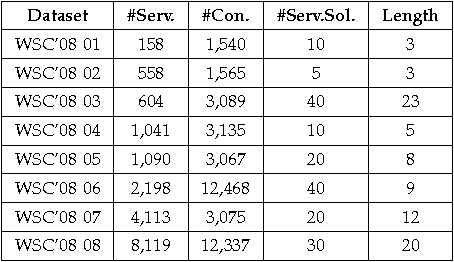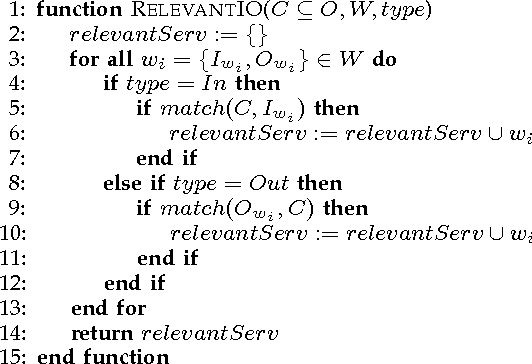Pablo Rodriguez-Mier
Hybrid Optimization Algorithm for Large-Scale QoS-Aware Service Composition
Sep 21, 2015



Abstract:In this paper we present a hybrid approach for automatic composition of Web services that generates semantic input-output based compositions with optimal end-to-end QoS, minimizing the number of services of the resulting composition. The proposed approach has four main steps: 1) generation of the composition graph for a request; 2) computation of the optimal composition that minimizes a single objective QoS function; 3) multi-step optimizations to reduce the search space by identifying equivalent and dominated services; and 4) hybrid local-global search to extract the optimal QoS with the minimum number of services. An extensive validation with the datasets of the Web Service Challenge 2009-2010 and randomly generated datasets shows that: 1) the combination of local and global optimization is a general and powerful technique to extract optimal compositions in diverse scenarios; and 2) the hybrid strategy performs better than the state-of-the-art, obtaining solutions with less services and optimal QoS.
An Integrated Semantic Web Service Discovery and Composition Framework
Feb 10, 2015



Abstract:In this paper we present a theoretical analysis of graph-based service composition in terms of its dependency with service discovery. Driven by this analysis we define a composition framework by means of integration with fine-grained I/O service discovery that enables the generation of a graph-based composition which contains the set of services that are semantically relevant for an input-output request. The proposed framework also includes an optimal composition search algorithm to extract the best composition from the graph minimising the length and the number of services, and different graph optimisations to improve the scalability of the system. A practical implementation used for the empirical analysis is also provided. This analysis proves the scalability and flexibility of our proposal and provides insights on how integrated composition systems can be designed in order to achieve good performance in real scenarios for the Web.
 Add to Chrome
Add to Chrome Add to Firefox
Add to Firefox Add to Edge
Add to Edge